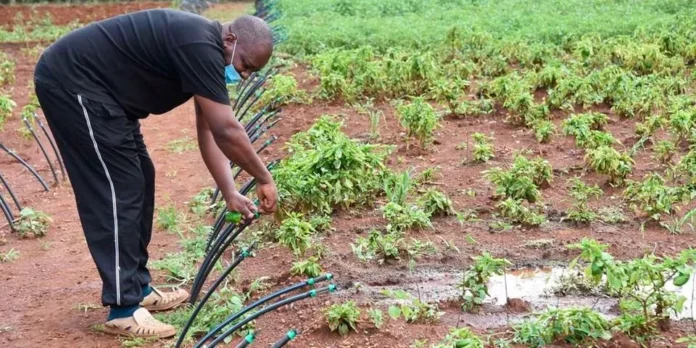Having worked as a journalist for 17 good years, Isaiah Lucheli was no longer interested in employment and felt it was the right time to explore other opportunities and be his own boss.
After his calculations, Lucheli quit journalism in 2015 for farming. He acquired a two-acre farm in his rural home in Mwamba sub-location in Webuye-Eldoret Road for his new business.
“I had worked six years as a reporter and 11 years as a correspondent in Kakamega, Eldoret, Nairobi, and Nyeri counties. I felt that was enough as an employee. For me it was time to be my own boss, and farming offered me that chance.” he said.
His two-acre farm hosts various vegetable varieties, including spider plant (saga), crotalaria (mito), Jute mallow (mrenda), cowpeas (kunde), coriander (Dania), solanum (managu), amaranth, onions and collard greens (sukuma wiki).
Caleb Karuga: how I built my Sh. 800,000 chicken farm after losing job at K24
“For about 17 years, I fed people with information, but now I feed them food. I farm various crops that include capsicum, which sits on three-quarter acres, and the remaining farming land hosts bananas, sukuma wiki, and traditional vegetables,” he said.
He sells a kilo of sukuma wiki at Sh30, spinach fetches Sh35 per kilo, while managu goes for up to Sh70 per kilo. He has some 5,000 capsicum plants that he farms under irrigation.
Lucheli learned about commercial horticultural farming from his friend who runs an agrovet. He has invested Sh350,000 in the business.
To grow the crop, the plants are planted in a nursery for 45-60 days before transplanting. They mature in 75 days after transplanting. He notes that capsicum has not been performing well on his farm due to poor soil.
How my dream of getting rich through chicken farming ended in tears
“My soil is murram, I need to improve it using manure before planting the crop. That is what agriculturalists advised me,” added Lucheli.
He uses a drip irrigation system to water his crops with water from his tanks which is pumped using solar power. He further cuts production costs through the use of organic manure from his geese, chickens, and guinea fowls.
“I have given the farm all my energies, and it is promising, especially with the support which I get from my wife and two sons. When they are around, I do not hire workers.” He said.









